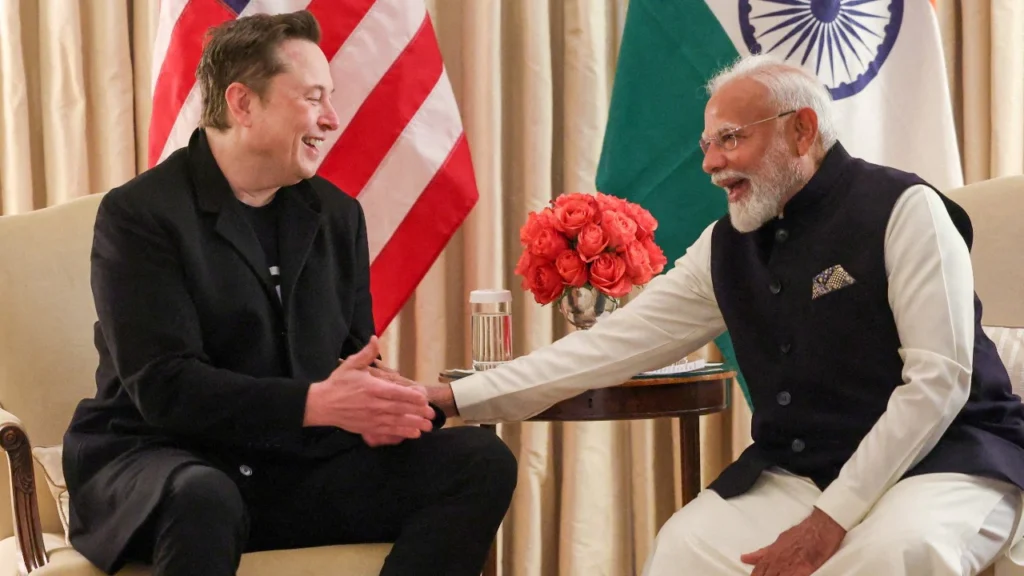Elon Musk-Led Tesla Expresses Concerns Over 100% Car Tariffs in India

Tesla, under the leadership of CEO Elon Musk, has once again voiced strong concerns about India’s steep import tariffs on electric vehicles (EVs), which can soar as high as 100%. The electric carmaker warns that such high duties make its vehicles significantly more expensive for Indian consumers, posing a major hurdle to its entry into the Indian automotive market.
Sky-High Tariffs a Major Roadblock
India currently imposes some of the world’s highest import duties on EVs, with tariffs reaching up to 100% on completely built units (CBUs). These tariffs nearly double the cost of an imported Tesla vehicle, making them out of reach for many consumers. Tesla has consistently urged Indian authorities to reconsider these rates, arguing that lower duties would support India’s transition to clean energy and attract foreign investment in the EV sector.
India’s Push for Local Manufacturing
To counterbalance these concerns, the Indian government unveiled a new policy in March 2024 aimed at encouraging global automakers to build vehicles locally. Under this policy, EVs priced above $35,000 can qualify for a reduced import duty of 15%, provided the manufacturer commits to establishing a production facility in India within three years and invests a minimum of $500 million. The move is intended to create a win-win situation—boosting local industry while still welcoming foreign players like Tesla.
Diplomatic Negotiations Ongoing
The issue of high tariffs has also entered the realm of international diplomacy. The U.S. government is actively working with India to ease these barriers, recognizing that tariff reform is critical for Tesla’s market debut. However, the push for concessions has been met with skepticism from Indian domestic automakers, who fear that reduced duties could harm local industries and lead to job losses. This tug-of-war reflects the complexity of balancing national economic priorities with the need to attract global tech investment.
Final Thoughts
Tesla’s difficulties highlight the broader challenges that foreign companies face when navigating India’s regulatory framework. While the Indian government’s steps toward easing tariffs and encouraging local manufacturing mark progress, reaching a sustainable and mutually beneficial agreement will require continued dialogue and compromise. The coming months could prove pivotal for Tesla’s ambitions in one of the world’s largest and fastest-growing auto markets.
India is preparing to amend its Civil Liability for Nuclear Damage Act, 2010, a move hailed by experts as a major step toward unlocking foreign investment and accelerating the country’s nuclear energy ambitions. The planned amendment will address longstanding concerns over liability burdens placed on nuclear suppliers—concerns that have deterred global companies from entering the Indian civil nuclear market.
A Stumbling Block Since 2010
Under the existing law, nuclear suppliers can be held financially liable in case of an accident, a clause that deviates from international norms. The legislation, introduced after the 1984 Bhopal gas tragedy, was designed to ensure corporate accountability. However, critics argue that it inadvertently stifled the development of India’s nuclear sector by making it financially risky for international players like Westinghouse (U.S.), Rosatom (Russia), and EDF (France).
The Proposed Changes
The proposed amendment is expected to bring Indian law in line with the Convention on Supplementary Compensation for Nuclear Damage (CSC), which limits supplier liability and assigns primary responsibility to plant operators. According to sources within the Department of Atomic Energy, the reform will include establishing a central liability fund and implementing stricter safety standards to offset reduced supplier liability.
Boost to India’s Clean Energy Goals
India currently operates 22 nuclear reactors with a total capacity of around 7 GW and aims to increase this to 22 GW by 2030. With rising energy demands and climate goals looming, nuclear power is seen as a critical piece of India’s low-carbon future.
Foreign investment and technology transfer are essential for achieving these targets. The amendment is expected to revive stalled nuclear projects, such as the Kovvada nuclear plant in Andhra Pradesh and Jaitapur in Maharashtra.
Opposition and Safeguards
The proposed law is likely to meet opposition from environmental groups and some political parties, who argue that reducing supplier liability compromises justice for potential victims. The government has responded by promising tighter regulatory oversight and swift compensation mechanisms.
The amendment is expected to be tabled during the Monsoon Session of Parliament. If passed, it will mark a significant policy shift, balancing investor confidence with public safety in pursuit of clean energy.



